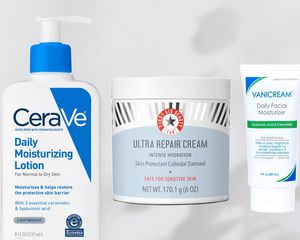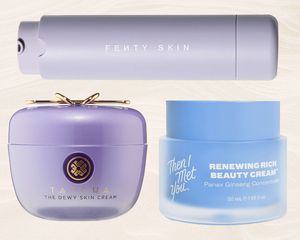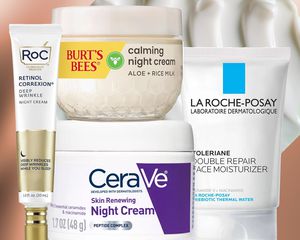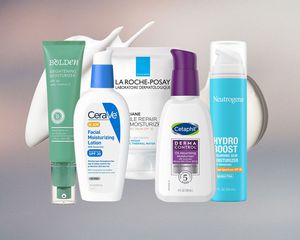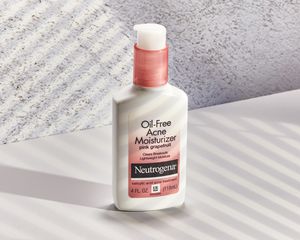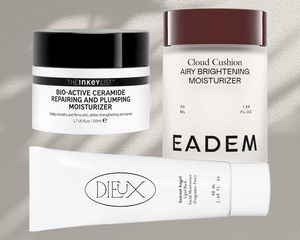:max_bytes(150000):strip_icc()/USED_argan-oil-for-skin-32-8cc251b8ddf14e7492e0919ad9b5fa08.jpg)
Tawni Bannister for BYRDIE
Even though there are tons (and we mean tons) of oils available in the skincare world, they can still be a little confusing. After all, if you’ve dealt with even the slightest amount of excess oil on your face, the idea of slicking your skin in a greasy liquid seems counterintuitive, to say the least.
But here’s the thing: Not all oils are created equal. So yes, while there are some oils that aren’t right for every skin type, others truly are not only ok for all skin types (even acne-prone!) to use, but even beneficial. One such wonder ingredient? Argan oil.
Meet the Expert
- Kenneth Howe, MD is a New York-based board-certified dermatologist at Wexler Dermatology.
- Marisa Garshick, MD is a board-certified dermatologist based in New York.
Argan Oil
Type of Ingredient: Hydrator
Main Benefits: Helps protect against environmental damage, offers moisture and nourishment to the skin, and soothes irritated skin.
Who Should Use It: While particularly beneficial for dry skin, it works well with essentially any skin type; however, proceed with caution if you have an inflammatory skin condition (such as seborrheic dermatitis), as these can be aggravated by external oils, according to Howe.
How often can you use it: It can be used once or twice daily.
Works well with: Argan oil works well layered over cream and other products in a skincare routine, and makes a great final step.
Don’t use with: When using products that contain linoleic and oleic acids, pay attention to how your skin reacts and make sure to use them as instructed.
What is Argan Oil?
Argan oil is a plant oil extracted from the kernels of the fruit pit of the argan tree (aka Argania spinosa) which grows in Morocco. “Traditionally, the oil extraction is a cold-pressed process—it’s done by exerting mechanical pressure with little to no applied heat,” explains New York-based board-certified dermatologist Kenneth Howe, MD. However, he notes, "The growing popularity and demand for argan oil has led to industrialized extraction methods which utilize solvents."
Though argan oil is most known for being particularly beneficial to dry, dull skin, "it has also been considered for acne as it is considered non-comedogenic and won’t leave the skin feeling greasy," explains New York-based board-certified dermatologist Marisa Garshick, MD. It is not only safe, but can also be beneficial to all skin types.
Argan Oil Benefits For Skin
- Rich in antioxidants: Argan oil is rich in antioxidants that help protect against environmental damage, like polyphenols and vitamin E. This vitamin is well loved in skincare for its anti-aging and skin softening properties. Both help scavenge free radicals, helping to maintain skin’s youthfulness.
- Rich in fatty acids: “AO is extremely rich in fatty acids, with about 95% of it consisting of fatty acids,” Howe notes. These offer moisture and nourishment to the skin.
- Anti-inflammatory: Another benefit of fatty acids like oleic and linoleic acids is that they’re also anti-inflammatory. “Not only does this make it an option to soothe irritated skin, but, due to these anti-inflammatory properties, it has also been considered for acne as it is considered non-comedogenic and won’t leave the skin feeling greasy,” Garhick says.
- Moisturizing: “In general, argan oil can be used by all skin types as those with dry skin will benefit from its moisturizing properties, while those with oily skin may also find it tolerable as it is lightweight and won’t leave the skin feeling greasy,” Garshick says. Again, it’s a common misconception that only dry skin needs moisture. Everyone’s skin needs moisture.
- Helps prevent transepidermal water loss: Argan oil provides healing and sealing to the skin's outer layer, which doesn't just improve appearance—it also prevents further drying and damage. “It does this by putting a stop to the transepidermal water loss (literally moisture leaking from the skin and evaporating into the air), which is caused by disruptions to the skin’s outermost barrier,” Howe explains.
Key Takeaways
- Argan oil is derived from the kernels of the fruit pit of the argan tree.
- It helps moisturize the skin, prevent transepidermal water loss, and protect against environmental damage.
- It can be found in several skincare products like moisturizers, face masks, eye creams, and more.
Side Effects
For the most part, argan oil does not have any side effects. “It is generally well tolerated, though some can experience some mild sensitivity,” Garshick says. However, proceed with caution if you have an inflammatory skin condition, as these, Howe explains, can be aggravated by external oils. “For example,” he notes, “seborrheic dermatitis is exacerbated by oils applied to the skin surface.”
How To Use It
Argan oil is often found in single ingredient oil formulas, however, it can also be found in the ingredient lists of moisturizers, face masks, eye creams, and more. Brands like Josie Maran and Kahina incorporate the hero oil into nearly every product they make. Argan oil can be used once or twice daily (it is appropriate for morning and evening skincare routines) as a final step in a routine, layered over your cream, or to seal in moisture.
Derm Tip: Pay attention to how your skin reacts if you use argan oil in a routine with the other ingredients you use. “The oleic acid and linoleic acid found in argan oil are thought to be penetration enhancers, and help improve penetration of other ingredients into the skin and can also reduce inflammation,” Garshick notes.
Especially in combination with actives, this is something to be aware of, because enhanced penetration of, say, a retinol serum isn’t always desired. “Especially for those with sensitive skin, the best way to avoid this is to slowly ease into using any new product and introduce only one new item at a time, so you know if your skin is reacting, what the trigger may be.” In short, when using products that contain linoleic and oleic acids, make sure to use them as instructed.
Josie Maran’s collection introduced many a product junkie to the versatile wonders of argan oil. In this moisturizer, the ingredient is paired with sodium hyaluronate for increased hydration and botanicals like watermelon seed oil, cucumber extract, and shea butter support skin moisture elasticity.
This argan oil-focused brand works directly with Berber women in rural Morocco to source the highest quality, certified organic, fair trade argan oil.
For under $7 you can experiment with 100% pure, cold-pressed argan oil, and benefit from its moisturizing, antioxidant properties.
A luxe rejuvenating cream by an Italian celebrity facialist in which argan is paired with calendula stem cells and peptides to support firm skin and collagen.
Public Goods' 100% argan oil is non-GMO, single origin, organic and vegan-friendly. Fans praise its smell, and use it on everything from their beards to their cuticles.

